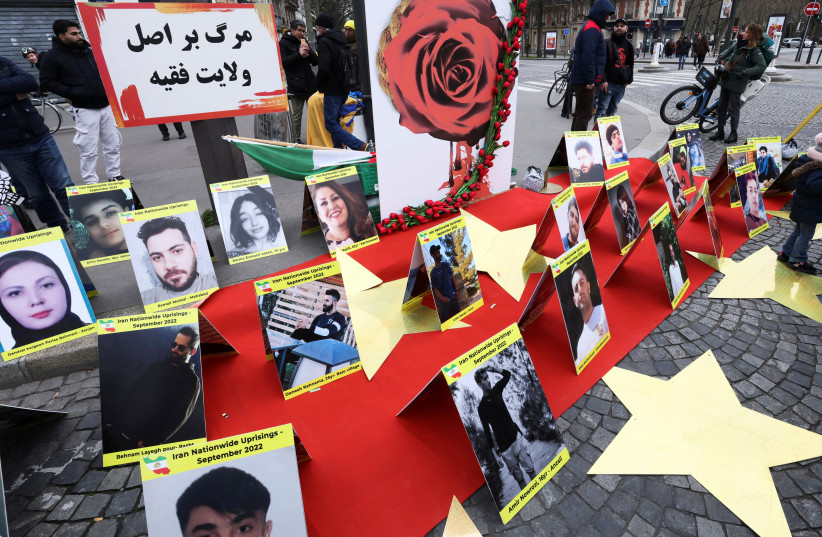Iran is growing a Shi'ite nucleus in Israel, manipulates internal strife - opinion

Iran, discontent with their current regime of torture, is attempting to expand their influence in Israel.
While the State of Israel is busy with internal strife, and while the Hebrew and Arabic mainstream media do not deal with this issue, a quiet yet determined nucleus of Shi’ites is growing in the country: a surprising phenomenon, given the fact that the Muslim majority of Israel’s Arab citizens are Sunnis (apart from approximately 2200 Alawite-Syrians, who hold Israeli citizenship and live in the northern village of Ghajar, on Israel’s border with Lebanon).
This small nucleus is encouraged and supported by a powerful regional player, which has for years busied itself with the creation of different proxies in the region. This manipulative player created Hezbollah, which has thus far succeeded in destroying the beautiful country of Lebanon from within. Thereafter, Iran and its ayatollah regime continued on, to bring forth death and destruction within Syria until its complete decay.
In both of those countries, internal strife and lack of social cohesion were inherent and deep prior to the arrival of the Iranian influence. All that remained for Tehran was to deepen the divide and manipulate it for the benefit of the ayatollahs.
Iran and Egypt
In recent years, the Iranian attempts to create a divide inside Egypt did not succeed, particularly owing to the iron clad response of the Egyptian regime against Iranian attempts at subversion and sabotage. More than once, the tension between the two countries has reached unprecedented heights – ambassadors were returned and Iranian espionage charges in Egypt were hushed. Iran and Egypt have endured a complex relationship since the abolition of the Iranian Monarchy and the rise of the ayatollah regime in 1979.
Cairo, for instance, did not forget that Khalid al-Islambouli, the murderer of the late Egyptian president Anwar Sadat, was Iranian and that the Iranian regime named a main street in Tehran after him. Iran, for its own part, did not forget that the Persian shah is buried in one of the most central and prestigious venues in the center of Cairo.
The Iranian regime, which strives for regional hegemony, clashes time and again with Cairo’s agenda for regional hegemony, along with Saudi Arabia, especially in the sense of its influence in the Muslim Sunni world; that is, despite the Saudi recent movement toward a more inward policy of improving and enhancing Saudi Arabia itself, rather than exporting its policies elsewhere.
Within this context, Egypt embraces the leading Sunni religious institution of Al-Azhar University, which is the bearer of religious decrees concerning all aspects of everyday lives for Sunni Muslims throughout the world. Hence, it also embraces the imam who heads the institution and has tremendous religious (and political) clout in the Muslim world.
Iran in Jordan
IN RECENT years, the Iranian regime has also begun quietly to tend to the “restoration” of Shi’ite religious sites in Jordan, particularly those that are close to the Jordanian-Israeli border. This phenomenon has not been welcomed by the local Arab or Hebrew press and media in Israel or abroad.
The Jordanian leadership has recognized a growing weakness in past decades, given the weak economy, hordes of Syrian refugees which have made their way into its territory and the constant competition which it sees from the Iranian-backed Hamas vis-a-vis the Palestinian majority which characterizes its citizens.
As the keeper of the Islamic holy sites, including al-Aqsa Mosque in Jerusalem, it is difficult to imagine that the Jordanian king sleeps peacefully while knowing that the Iranians are constantly backing and encouraging Hamas to “steal” this ownership from the Jordanian Royal family.
The current Iranian regime – the one for which it does not suffice to rape, incarcerate and hang Iranian women – has recently begun a new and diabolically creative means of torture by extracting the right eye of Iran’s most beautiful women and poisoning Iranian schoolgirls as a form of warped revenge for the women-led revolution against the Mullah in Iran. It has also begun to try and widen its influence inside Israel.
Iran in Israel
Thus, quietly, and under the radar, much to the disdain of many of Israel’s Sunni imams, there is a small, yet growing local nucleus of Muslims who accept Shi’ite teachings and support the Alawite regime in Syria and the Shi’ite regime in Iran. It is no longer a crazy notion, but one which is known by many in the Arab Israeli communities, particularly in the north of the country.
The more the internal strife deepens in Israel, the easier Iran’s quest to strengthen that aforementioned nucleus will be. Simultaneously, the more the Arab Israeli minority in Israel remains outside of the mainstream media and government’s attention, the easier it will be for parts of this minority to be manipulated by Iran or its regional proxies. Much like in our neighboring countries, where internal strife and divisions were manipulated by Iran, the same may happen here and will proceed if Israel unwittingly allows it.
The ayatollah regime has proved, time and again that it does not have any qualms about applying any, and all means to achieve its much-sought-after aim – regional hegemony – and what better way than to be the “savior” of one of Islam’s holiest sites, al-Aqsa Mosque? Those who have no qualms about extracting their own citizens’ eyes, killing Ukrainians in a war, not theirs, and arming the Houthis in their imagined war against the Gulf countries, will not hesitate to destroy the Zionist entity.
It is time to wake up before it is too late.
The writer, a former MK, has been appointed chairperson of the newly-established Women’s Impact Forum of the World Jewish Congress.
Jerusalem Post Store
`; document.getElementById("linkPremium").innerHTML = cont; var divWithLink = document.getElementById("premium-link"); if (divWithLink !== null && divWithLink !== 'undefined') { divWithLink.style.border = "solid 1px #cb0f3e"; divWithLink.style.textAlign = "center"; divWithLink.style.marginBottom = "15px"; divWithLink.style.marginTop = "15px"; divWithLink.style.width = "100%"; divWithLink.style.backgroundColor = "#122952"; divWithLink.style.color = "#ffffff"; divWithLink.style.lineHeight = "1.5"; } } (function (v, i) { });

